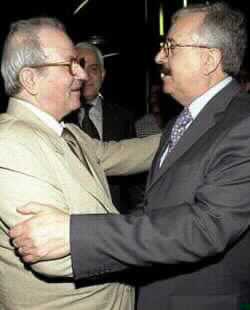HIGHLIGHTS: UN Won't Comment on Sahaf's Statement, Rejected by U.S.||Sabri Preparing Response to Annan Letter||Blix Won't Accept Baghdad's Invitation to Visit Until Iraq Approves Return of UN Inspectors||Washington Demands 'Verified Disarmament'||Opinion Polls in Britain Heavily against War||Sahaf: " U.S., Iraqi Opposition Talks in Washington, Reflect U.S.'s Political Bankruptcy|| STORY: Iraq's information minister said on Monday U.N. arms inspectors had finished their work when they left Iraq four years ago, but the United Nations said it was still awaiting an official response from Baghdad on the issue.
In Baghdad, Foreign Minister Naji Sabri said Iraq was preparing a reply for the United Nations.
Earlier, Information Minister Mohammed Saeed al-Sahaf told Arabic al-Jazeera satellite television: "Work under the framework of the United Nations regarding...resolution 687, i.e. what is called prohibited weapons in Iraq, had been concluded."
"They say (the work) has not been concluded, they allege that there are more (weapons), that kind of talk can be responded to and proven. There are methods and ways that are easily available to verify that and they know them," he said.
At U.N. headquarters in New York, spokesman Fred Eckhard said there would be no comment on Sahaf's statement.
Eckhard said the world body was still awaiting word on whether Baghdad would invite weapons inspectors to return.
He said the United Nations had last communicated with Iraq in last week's letter from Secretary-General Kofi Annan to Iraqi Foreign Minister Naji Sabri. "We're still awaiting an official reply to that letter," Eckhard told reporters.
Sabri told reporters in Baghdad: "We are preparing a reply to his excellency the U.N. Secretary-General." He refused to elaborate.
It was not clear whether Sahaf's comments indicated a final rejection of the return of arms inspectors.
BLIX WON'T ACCEPT BAGHDAD'S INVITATION TO VISIT UNTIL IRAQ ACCEPTS RETURN OF INSPECTORS
Earlier this month Iraq invited the chief U.N. weapons inspector, Hans Blix, to visit Baghdad for technical talks, hinting that it might allow inspections to resume.
Annan's letter had stated that technical talks in Baghdad with chief U.N. weapons inspector Hans Blix concerning Iraq's suspected weapons of mass destruction could take place only after U.N. weapons inspectors were invited in and back on the ground.
The arms inspectors left Iraq in December 1998, hours before a U.S.-British bombing raid, and have not been allowed to return since.
A return of inspectors is key to a suspension of U.N. sanctions imposed on Baghdad after its 1990 invasion of neighboring Kuwait. The inspectors' goal is to certify that Baghdad has eliminated all its weapons of mass destruction.
The United States kept up its war of words on Monday, accusing Saddam of keeping out weapons inspectors because he had something to hide.
"We need to make sure that Iraq has no weapons of mass destruction or long-range ballistic missiles. That's what's required by the U.N. Security Council resolutions, and that's what we expect to see done," deputy State Department spokesman Philip Reeker told a news briefing in response to Sahaf.
WASHINGTON DEMANDS 'VERIFIED DISARMAMENT'
"They've refused to face up to their obligations and continue to obfuscate and look for ways to move the goal posts when it's a simple situation," Reeker said.
He said the issue was not so much inspections, as "verified disarmament."
Countries in Europe and the Middle East have warned the United States against a military assault on Iraq.
Jazeera reported Sahaf as saying an Iraqi invitation for an "equitable dialogue" with the United Nations had not included an offer for the return of inspectors.
In London, British parliamentarian George Galloway said on Monday after talks with Saddam in Baghdad last week that the Iraqi leader had offered access to U.N. inspectors.
But Galloway, a member of Prime Minister Tony Blair's Labour Party, said Iraq should not be expected to allow the inspectors back in the face of possible U.S. attack.
Blair has been Bush's staunchest supporter in opposing Iraq, but Galloway said the British leader should accept Saddam's olive branch -- and also take note of opinion British opinion polls running heavily against war.
Meanwhile, Washington has been holding talks with Iraqi opposition groups on how to fill the void if it follows through on its threats to topple Saddam.
Sahaf described Iraqi opposition groups as "bats" and said the meetings were a "shallow ploy" that reflected the "political bankruptcy" of the U.S. administration.
PHOTO CAPTION
Iraq's Foreign Minister Naji Sabri, right, greets Palestinian Foreign Minister Farouq Qadoumi shortly after his arrival at Saddam airport in Baghdad on Monday, Aug. 12, 2002. Sabri said Iraq was preparing a reply to the letter from U.N. Secretary-General Kofi Annan on the return of UN arms inspectors to Baghdad. Annan on Monday asked Baghdad to send a formal invitation to arms inspectors. (AP Photo/Jassim Mohammed)
- Author:
& News Agencies - Section:
WORLD HEADLINES


 Home
Home Discover Islam
Discover Islam Quran Recitations
Quran Recitations Lectures
Lectures
 Fatwa
Fatwa Articles
Articles Fiqh
Fiqh E-Books
E-Books Boys & Girls
Boys & Girls  Hajj Rulings
Hajj Rulings Hajj Fatwas
Hajj Fatwas














